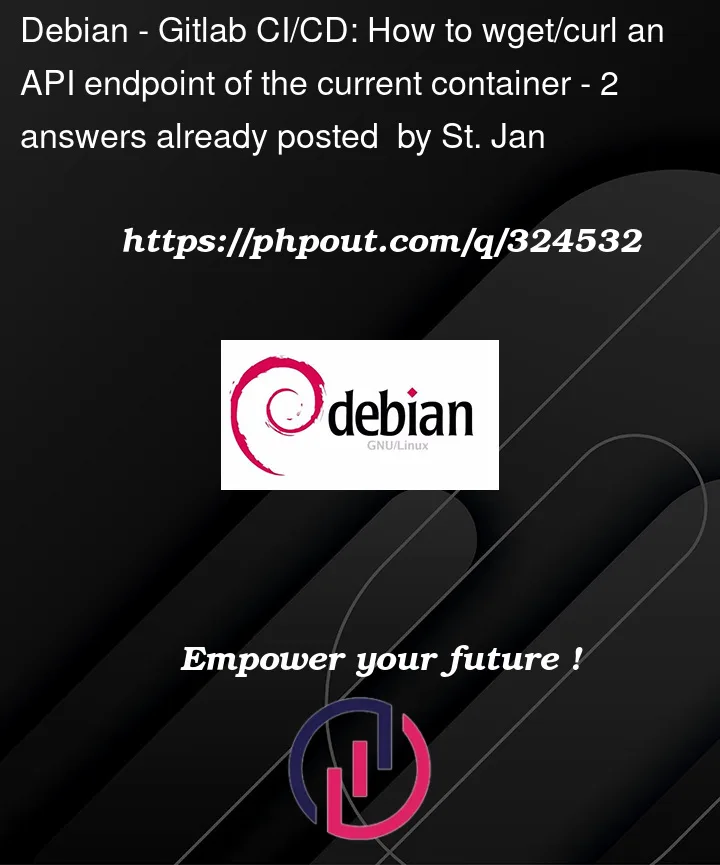I am setting up an Gitlab CI/CD pipeline to test several Laravel micro services and an front-end. To check if the front-end displays the results from the API endpoints correctly I thought to pass it the results form the endpoints as artifacts.
I thought this would be simple, like doing something like
after_script:
...
- wget --no-check-certificate 'https://localhost/api/product/' -O ./artifacts/product_api.json
artifacts:
when: always
paths:
- ./artifacts/product_api.json
But I was wrong. Localhost is the server that starts the containers. So somehow I need to find out what is the Hostname or the IP of the container.
I found various place (for example here) that claim the hostname is ‘docker’, yet I can’t even ping that name.
Anothers suggest I find is using:
- CONTAINER_IP=$(docker inspect -f '{{range .NetworkSettings.Networks}}{{.IPAdress}}{{end}}' myapp) // Replace myapp with your container name.
- sleep 15
- curl $CONTAINER_IP:8000
but this would require me to install Docker, which I would much rather not.
Is there a way to reach your current container in Gitlab CI/CD? (I am NOT self-hosting the runners)
My .gitlab-ci.yml looks something like:
Product-API:
image: serversideup/php:8.2-fpm-nginx
services:
- name: mysql:8.0.33-debian
alias: mysql
entrypoint: ['/bin/sh', '-c', 'sed -i -e "/^skip-name-resolve/d" /etc/mysql/conf.d/docker.cnf && /usr/local/bin/docker-entrypoint.sh mysqld']
variables:
GIT_SUBMODULE_STRATEGY: recursive
GIT_SUBMODULE_FORCE_HTTPS: "true"
#FF_NETWORK_PER_BUILD: 1
#mysql variables
MYSQL_DATABASE: $MYSQL_DATABASE
MYSQL_ROOT_PASSWORD: $MYSQL_ROOT_PASSWORD
MYSQL_USER: $MYSQL_SHOP_ADMIN
MYSQL_PASSWORD: $MYSQL_SHOP_ADMIN_PASSWORD
#laravel variables
APP_DEBUG: "true"
DB_CONNECTION: mysql
DB_HOST: $MYSQL_HOST
DB_PORT: 3306
DB_USERNAME: '$PRODUCTAPI_DB_USER'
DB_PASSWORD: '$PRODUCTAPI_DB_PASSWORD'
DB_DATABASE: $MYSQL_DATABASE
before_script:
#download and unpack the product database
- mkdir artifacts
- 'curl --location --output ./artifacts/db_dump.zip --header "PRIVATE-TOKEN: $ARTIFACTS_TOKEN" "https://gitlab.com/api/v4/projects/test1/jobs/artifacts/develop/download?job=Database-Tables"'
- 'curl --location --output ./artifacts/mysqlusersandgrants.zip --header "PRIVATE-TOKEN: $ARTIFACTS_TOKEN" "https://gitlab.com/api/v4/projects/test2/jobs/artifacts/develop/download?job=Database-Users"'
- unzip ./artifacts/db_dump.zip
- unzip ./artifacts/mysqlusersandgrants.zip
#put the database in place
- apt-get update
- apt-get install -y mysql-client
- mysql -uroot -p$MYSQL_ROOT_PASSWORD --host=$MYSQL_HOST "$MYSQL_DATABASE" < ./artifacts/db_dump.sql
- mysql -uroot -p$MYSQL_ROOT_PASSWORD --host=$MYSQL_HOST mysql < ./artifacts/mysqlusersandgrants.sql
#putting and .env file in place
- mv .env.example .env
#install Laravel
- composer install
- php artisan key:generate
- php artisan config:cache
- php artisan route:cache
- php artisan view:cache
#setting user and group rights
- chown -R webuser:webgroup .
script:
- php artisan test --log-junit productapi_results.xml
after_script:
- 'curl -k --location --output ./artifacts/product_api.json "https://docker/api/product/"'
- cat ./artifacts/product_api.json
artifacts:
when: always
paths:
- ./artifacts/product_api.json
- productapi_results.xml
reports:
junit: productapi_results.xml
This gives the error:
Running after script...
$ curl -k --location --output ./artifacts/product_api.json "https://docker/api/product/"
% Total % Received % Xferd Average Speed Time Time Time Current
Dload Upload Total Spent Left Speed
0 0 0 0 0 0 0 0 --:--:-- --:--:-- --:--:-- 0curl: (6) Could not resolve host: docker
[18-Jan-2024 20:19:43] NOTICE: Terminating ...
[18-Jan-2024 20:19:43] NOTICE: exiting, bye-bye!
WARNING: after_script failed, but job will continue unaffected: exit code 1




2
Answers
I couldn’t find where you start the web server, thus added that too:
&is added.sleep 10.You can’t use
after_scriptto make request to your web server that runs inscriptphase:From doc:
To make things clear below is minimal reproducible example:
"Could not resolve host: docker"? I have only seen ‘
docker‘ as a hostname when accessing the docker registry hostname, where the shorter service hostnamedockeris expected.In GitLab CI/CD, especially when not self-hosting runners, the hostname
dockerdoes not necessarily point to the current running container or any service within the CI job. That hostname might not be recognized in the GitLab-managed runners’ environment.In your case, the Laravel application is accessible to the curl command within the same container, using localhost as the hostname and 8000 as the port number.
You have used
httpsin yourcurlcommand. Make sure your Laravel application is set up to handle HTTPS requests. If it is not configured for HTTPS, you should usehttpinstead (so no-koption needed).Since your Laravel application and the
curlcommand are executed within the same CI job (and hence, within the same container), you should be able to uselocalhostto access your application. That means the URL in yourcurlcommand should behttp://localhost:8000/api/product/if you are using the default HTTP port 8000.Make sure the port you are using in the
curlcommand matches the port on which your Laravel application is running. If you are using the default Laravel port (8000), thenlocalhost:8000is correct. If you have configured a different port, adjust thecurlcommand accordingly.Make sure the Laravel server is running when you execute the
curlcommand. As mentioned in the previous response, you can start the Laravel server in the background during thescriptphase of your CI/CD pipeline.Your
.gitlab-ci.ymlwould be: